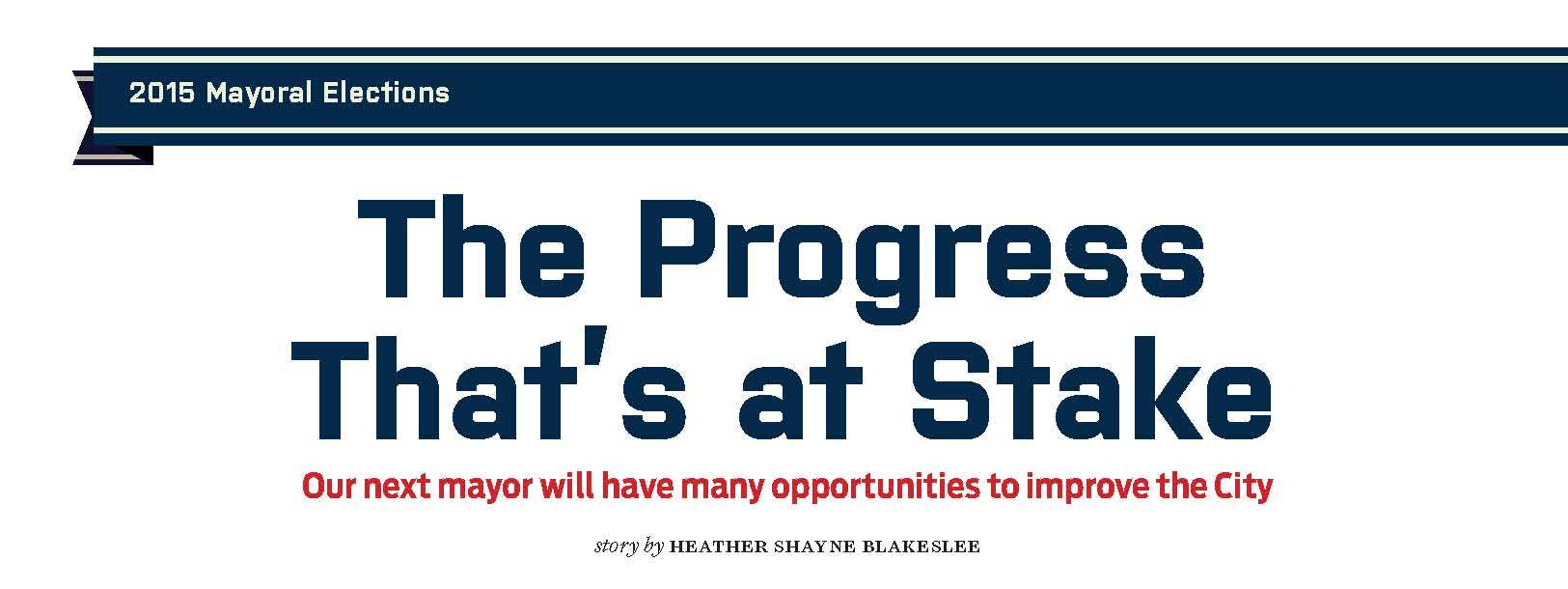
Political progress has been made, but much work remains
Eight years ago, the new crop of mayoral candidates were like sustainability seedlings, just beginning to poke their soft green heads above the soil and move toward the light.
There were some unintended moments of comedy along the way. During a candidate forum, one of the candidates purported to be a fan of “alterior energy,” and wondered aloud how a green roof would be mowed. The current class of mayoral contenders, and the City itself, has come a long way since our collective awakening, in large part due to the leadership of the Nutter administration.
As sustainability advocates anxiously await a post-Nutter Philadelphia, two things are clear as we approach the run-up to the mayoral primary elections on May 19th. First, most of the viable mayoral candidates appear to acknowledge that a sustainable Philadelphia means a safer, more prosperous city. Second, this race is far from over, and it’s possible that any of the candidates could yet decide to seriously court the sustainability voter.
Six mayoral candidates participated in the Next Great City Forum on March 3, organized by a collective of over 100 civic-minded organizations and companies led by Penn Future. No one emerged as a front runner, articulate out of the gate on these complex issues.
To find out more, Grid sent a survey to each campaign. Five mayoral candidates have shared their vision for a sustainable Philadelphia, answered whether or not they would maintain or expand funding for the Mayor’s Office of Sustainability, and explained how they would balance public health with economic development. We supplied a number of wide-ranging additional questions, from policies pertaining to bicycling to plans for protecting the city as it inevitably faces super-sized storms and a changing climate.
Philadelphia’s population of registered voters skews heavily Democratic, which means that the winner of Democratic primary on May 19, in all likelihood will be the next mayor.
Philadelphia’s population is just over 1.5 million, but some estimate that our new mayor will be the candidate who can amass a mere 100,000 votes. Grid has 75,000 readers. Your vote will count.
Our next mayor will have many opportunities to improve the City
The City of Philadelphia’s progress toward becoming a model of urban sustainability has been a collaborative effort among many stakeholders: nonprofit organizations, educational institutions, neighborhood groups and active individuals, leaders in the corporate world and partners in government. How the next mayor will work with the existing community of sustainability advocates, both inside and outside government, is critical. Highlighted here are just some of the issues and programs that the new mayor could influence.
The Mayor’s Office of Sustainability: Will it be funded?
Dr. Mark Alan Hughes, the original director of the Mayor’s Office of Sustainability, began his new position by trying to recognize and build upon the existing work of city departments, especially those that were already ahead of the sustainability curve. Among them were the Office of Capital Programs, which was already commissioning green buildings, and the City Planning Commission, which was carefully looking at how a new zoning code was going to impact the City for generations. These two departments also helped organize the first citywide sustainability training for government workers, which included everyone from Prisons to Licenses and Inspections.
Current Director Katherine Gajewski has continued and expanded upon that strategy. Gajewski’s goal has been to embed Greenworks, the City’s sustainability plan, in permanent departments that are supported by her office.
Greenworks outlines dozens of specific, measurable goals around water, energy, equity, the environment, the economy and community engagement. Greenworks goals are time-bound, and set to expire with Mayor Nutter’s second term. Progress toward those goals is impressive, and publicly available in yearly reports.
In the meantime, the Office of Sustainability has been made permanent itself through a public vote on the City Charter. It was an important victory, but not one that guarantees the efficacy of the Office. Funding, determined by the mayor and City Council will determine how much traction the office will have in a new administration.
Our world class stormwater management plan: Will it be supported?
“Green City, Clean Waters” is the name of the Water Department’s nationally and internationally recognized green infrastructure plan. Even New York City is jealous; The New York Times’ editorial board called out Philadelphia as a place that New York City should emulate when it comes to managing the stormwater that floods basements, closes roadways, and destroys the water quality in our rivers by overwhelming water treatment plants and sending raw sewage into the Delaware. While the plan is about water quality, it also translates into green space. Projects like the beautiful plantings on the road medians on Delaware Avenue give us more greenery and help us comply with the Clean Water Act.
Continued support of the Water Department’s plans—including making sure that the city gets the recognition it deserves and that builders and developers are supported as they try to comply with regulations—should be on any new mayor’s agenda.
Energy efficiency: Will careful attention be paid to improving our buildings?
Talking about energy efficiency—especially if you start throwing around phrases such as “commercial benchmarking policy”—is likely to garner yawns from even staunch environmentalists. That needs to change, considering that buildings are the number-one consumer of electricity in the world, and a significant contributor to global greenhouse gas emissions. If we don’t drastically rethink our built environment, the dream of a healthy, prosperous future for all will remain just that—a dream.
Philadelphia established itself as a national leader by passing legislation that requires commercial building owners to track and publicly disclose how much energy their buildings are using. Our city has a 90 percent compliance rate so far, and the new mayor could advance a similar reporting policy in the residential sector. Leading by example should also continue, and the mayor should actively pursue making government buildings efficient, reducing consumption and taxpayers’ liability for unnecessarily high energy bills.
Recycling: Will the plague of plastic bags be addressed?
The goal outlined in Greenworks was to divert 70 percent of waste from landfills by 2015, up from the 53 percent baseline in 2008. They smashed their goal in 2011, getting to 77% percent through a combination of recycling and converting waste to energy. Despite that progress, Philadelphia still has a long way to go be a leader with waste. Toronto, for instance, offers city-sponsored, curbside compost pick-up, and only collects trash once every other week to incentivize people to rely more heavily on their recycling and compost bins.
While a citywide composting program may seem far off, there is growing momentum to institute a five-cent charge on plastic bags. Not only do these single-use bags cause unsightly litter throughout the City, they are also a tremendous obstacle to our recycling efforts. Plastic bags, when put into recycling bins, gum up the recycling machinery, and are responsible for an hour of downtime for every seven hours a recycling plant runs. The time dedicated to disentangling plastic bags from machinery drives up costs and reduces productivity.
Anthony Williams is the lone dissenter in our pages regarding a proposed charge for plastic bags, citing that a charge would disproportionately affect the poor.
Bicycling and pedestrian infrastructure: Can the streets be made safer for everyone?
Many candidates are talking about Vision Zero, which is an international goal of reducing traffic related deaths to zero. It’s pulled from the Better Mobility 2015 platform created by The Bicycle Coalition of Greater Philadelphia. How the City proceeds with further investment in bike lanes, the new Bike Share program, and how public outreach efforts are handled will significantly effect how, where, and who is able to safely take to the streets on foot and on bike.
Also mentioned by at least one candidate, is SWEEP, a citywide program created to educate citizens about their responsibilities under the sanitation code.
Blight: How will the Philadelphia Land Bank be run?
There are approximately 8,000 vacant properties in Philadelphia owned by the City. The creation of the Philadelphia Land Bank has established a transparent system in which citizens can acquire properties and return them to productive use. The lots can be transformed through many kinds of community development projects, including affordable housing, public gardens and urban agriculture. It’s a relatively new program, and how much thought and funding goes into its implementation will significantly affect public safety, access to open space and revenues for the City.
Energy Hub: Does it mean clean tech, or petrochemical pollution?
In 2010, Philadelphia won a competitive national award from the Department of Energy to be a research hub for energy efficiency. Even after several direction, leadership and name changes, the words “Energy Hub” meant one thing: The public and private projects at the Philadelphia Navy Yard. Now, Philadelphia Energy Solutions (PES), which runs the old Sunoco refinery, wants to rebrand “Energy Hub” to mean its own plans to make Philadelphia the epicenter for refining natural gas and attracting new petrochemical industries to the heart of the City (see Grid’s March 2015 cover story).
On March 13, City Council held public hearings on how to approach new energy opportunities for the City, and constituents who hear “Energy Hub” both ways were present. While PES CEO Phil Rinaldi was testifying, activists held up signs that read, “Climate Denier” and “Invest Green, Not Fossil Fuel.”
The next mayor, and the next City Council, will have to decide which face we project to the rest of the world.
Stay tuned as we release our interviews with each of the five mayoral candidates that have shared their vision for a sustainable Philadelphia.



